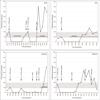Rituximab for the treatment of refractory pediatric autoimmune diseases: a case series
- PMID: 20184679
- PMCID: PMC2827140
- DOI: 10.1186/1757-1626-0002-0000006609
Rituximab for the treatment of refractory pediatric autoimmune diseases: a case series
Abstract
Introduction: To report on efficacy, tolerability and safety of rituximab in children with refractory autoimmune diseases.
Case presentation: Five patients (juvenile dermatomyositis, Wegener's granulomatosis, systemic lupus erythematosus, myasthenia gravis and multiple sclerosis with systemic lupus erythematosus) were treated with rituximab and followed for a median time of 2.5 years. Two patients achieved remission (systemic lupus erythematosus, Wegener's granulomatosis). Three patients had a refractory disease course and underwent autologous stem cell transplantation. Of those, two achieved remission (juvenile dermatomyositis, myasthenia gravis), one died of complications after transplantation (multiple sclerosis/systemic lupus erythematosus). No severe adverse events occurred.
Conclusion: Efficacy of rituximab was variable ranging from complete remission to inefficacy. Treatment was safe.
Figures

References
-
- O'Neill SK, Shlomchik MJ, Glant TT, Cao Y, Doodes PD, Finnegan A. 22, Antigen-specific B cells are required as APCs and autoantibody-producing cells for induction of severe autoimmune arthritis. J Immunol. 2005;174:3781–3788. - PubMed
-
- Lund FE, Garvy BA, Randell TD, Harris DP. Regulatory roles for cytokine-producing B cells in infection and autoimmune disease. Curr Dir Autoimmun. 2005;8:25–54. full_text. - PubMed
-
- Emery P, Furst DE, Ferraccioli G, Udell J, van Vollenhoven RF, Rowe K. Long-term efficacy and safety of a repeat treatment course of rituximab in RA patients with an inadequate response to disease-modifying anti-rheumatic drugs. Ann Rheum Dis. 2006;65:58.
LinkOut - more resources
Full Text Sources

